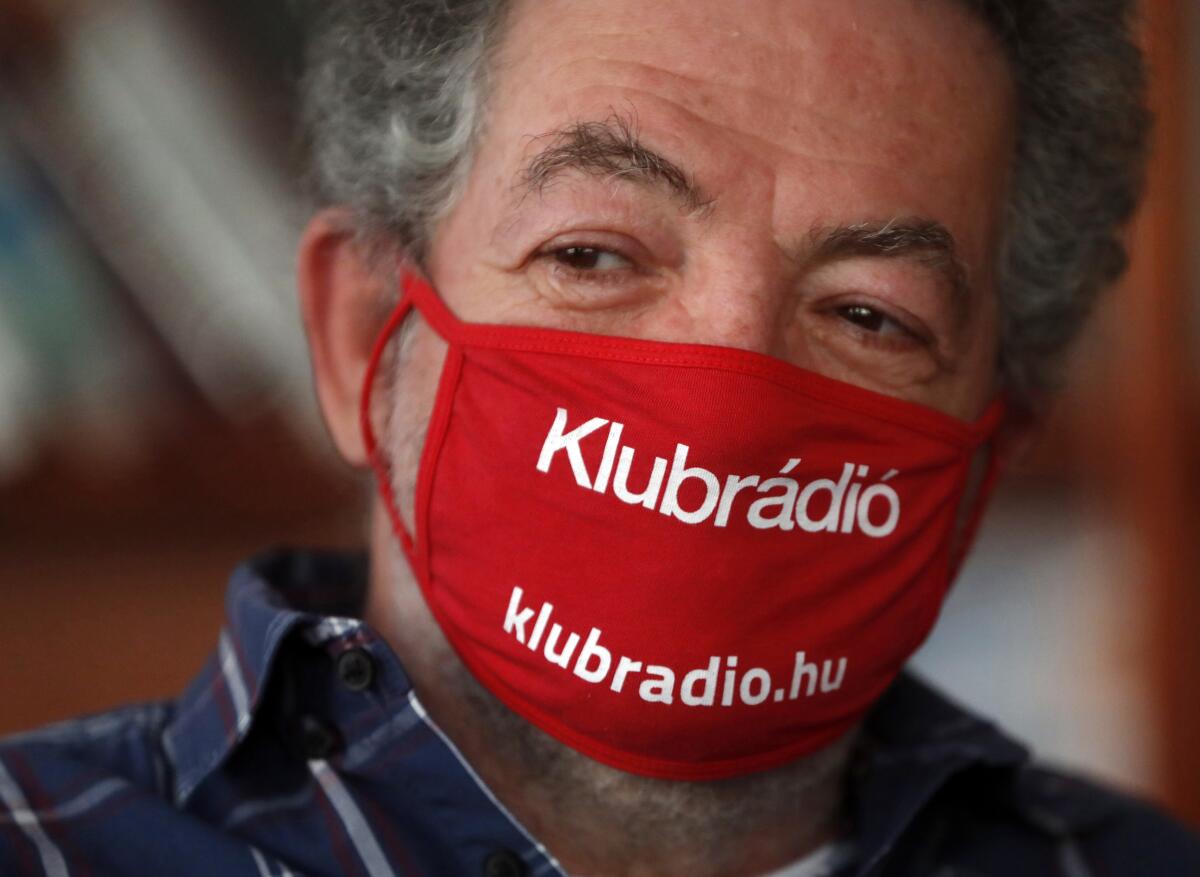Court ruling will force one of Hungary’s last independent radio stations off the air

BUDAPEST, Hungary — One of Hungary’s last remaining independent radio stations will be forced off the airwaves and limited to online broadcasts after a court on Tuesday upheld a decision by the country’s media regulator not to extend its broadcasting license.
The court dismissed a challenge by Klubradio, a liberal-leaning commercial station broadcasting in Budapest and the capital’s surrounding areas, to the September decision by Hungary’s Media Council. The council refused to renew the station’s claim to the radio frequency it used, a move that has led to accusations of the government infringing on media rights and political bias among the body’s members.
Klubradio’s chief executive and director, Andras Arato, called the court’s verdict “shameful,” and told the Associated Press that the company plans to appeal at Hungary’s highest court, the Curia.
“We are witnesses to a verdict that serves an endlessly cowardly, anti-democratic, illiberal system. It is not a surprise, but it is still sad,” Arato said.
While Hungary’s media regulator says it acted in accordance with the law when it refused to extend the station’s broadcast license, the case has reinvigorated a debate over freedom of the press and outsized political influence in Hungary’s media market.
In a statement last week, the National Assn. of Hungarian Journalists called Klubradio “the only remaining ... public service broadcaster in Hungary whose content is not under government influence.”
“The hegemony of pro-government broadcasters would increase to 100% with the silencing of Klubradio, which would be completely unprecedented in Europe,” the group wrote.
Critics of the Hungarian government, which Prime Minister Viktor Orban and his Fidesz party have led since 2010, warn of a systematic assault on media freedom and pluralism in the country as many outlets have been consolidated into the hands of government-allied businesspeople.
In 2018, nearly 500 newspapers, television and radio stations and websites were donated by their owners simultaneously to a government-controlled media conglomerate which Orban subsequently designated as “of strategic national importance,” exempting it from review by competition regulators. Those outlets take in around 40% of all media revenues in Hungary.
The Hungarian state is also the country’s largest advertiser, and a study by the media watchdog Mertek Media Monitor found that it purchases ads primarily in outlets with pro-government leanings. Some media analysts say other commercial advertisers avoid placing ads in liberal outlets for fear of retribution.
Last week, the International Press Institute, a press freedom organization based in Vienna, Austria, joined five other European press organizations in accusing the Fidesz party of seeking to silence Klubradio as part of a crackdown on outlets that publish or air critical views of the government.
“Fidesz has, over a period of several years, laid the groundwork and created the necessary conditions to make it all but impossible for the station to remain on the airwaves, blocking all remaining available options for when its renewal was rejected,” the groups wrote in a statement.
But Hungary’s media regulator — which in 2013 stripped Klubradio of its broadcasting licenses in rural Hungary, limiting it to Budapest — denies that its decision included political considerations.
“The Media Council, in all cases, acts in accordance with current laws and regulations,” the communications department of the National Media and Infocommunications Authority told the Associated Press in an email.
“The authority does not operate on a political basis but a professional one, and rejects such allegations,” it wrote.
In justifying its decision, the Media Council argued that in 2017 Klubradio twice failed to provide adequate monthly data on its broadcasts to the media regulator, an infraction of Hungarian media law that precludes broadcasters from consideration for automatic extension of their frequency licenses.
But Arato, Klubradio’s director, argues that the Media Council, a five-member body appointed by Hungary’s parliament, cannot be considered an independent regulator since all of its current members were nominated to nine-year terms by the ruling Fidesz party.
He called the council members “party soldiers,” and claimed that other broadcasters that had committed the same infractions received license extensions.
“This verdict shows that today in Hungary, an authority has the right to make completely opposite judgments for different media providers,” Arato said. “Those who are suitable to the system get their frequencies extended, and those who aren’t are rejected.”
Gabor Polyak, the head of Mertek Media Monitor, also cited two other radio stations that committed similar infractions but received license extensions from the Media Council, and said the court’s decision made Klubradio’s future “extremely uncertain.”
“This is discrimination against Klubradio that violates the constitution and European law. This was not the the only possible judgment,” he said in an email.
Klubradio and two other applicants have applied for a new license on the FM frequency in an open tendering process, but it could take up to a year or more before media authorities reach a decision on the winner. Until then, Klubradio has encouraged its listeners to tune in online after Monday, when 92.9 FM falls silent.
More to Read
Sign up for Essential California
The most important California stories and recommendations in your inbox every morning.
You may occasionally receive promotional content from the Los Angeles Times.










